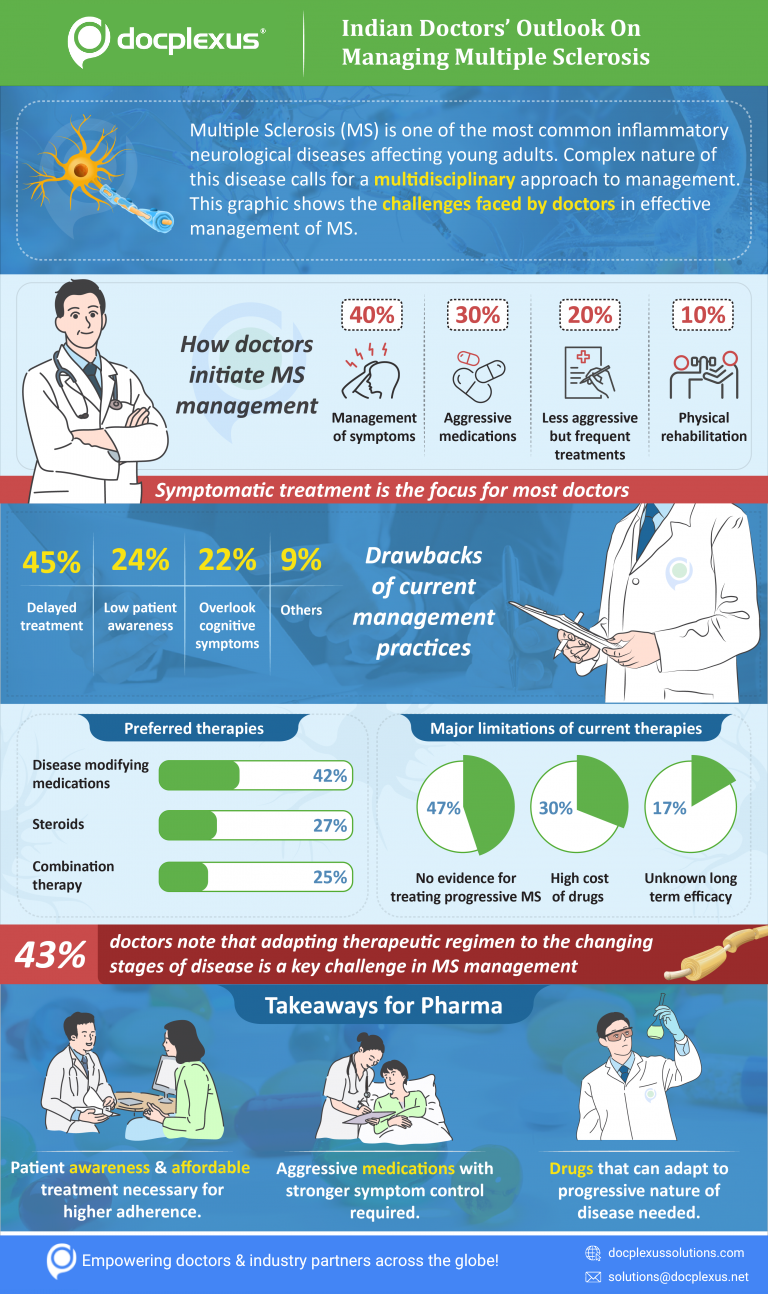
Multiple Sclerosis (MS) is one of the most common inflammatory neurological diseases affecting 2.8 million young adults worldwide. Various emerging therapies aim to reduce the global MS burden. However, physicians face many challenges while developing a management strategy for MS patients. Data from recent publications and case reports reveal that many patients do not get a definitive diagnosis for years, while others get misdiagnosed with multiple conditions that closely resemble the disease. Evaluating different treatments and identifying the most effective method is crucial but difficult.
We conducted a survey to acquire physicians’ insights pertaining to this and other hurdles related to the management of MS.
Survey Details
Aim: To gauge doctors’ outlook on managing MS
Methodology: A nationwide online poll on Docplexus
Sample Size: 1,704 doctors comprising Neurologists, Neurosurgeons, General Physicians and Consulting Physicians.

Analysis
Diagnosing MS
The fundamental pathological data for MS was revealed by histopathological studies in 1838 by Carswell and in 1941 by Cruveilhier. It is characterized by an array of lesions such as focal demyelination, gliosis, inflammation and consequent axonal damage. Thus, the symptoms of MS may overlap with other neurological disorders. Owing to the complex presentation of the disease, the diagnosis of MS poses great difficulty.
According to our survey, 92% of the doctors claim to have come across patients who were wrongly diagnosed with MS. Of this 34% of doctors reported that more than 50% of patients had a misdiagnosis of MS.
The timely and appropriate diagnosis of MS is hampered not only by the disease presentation but also due to the lack of adequate diagnostic tools. In our survey, 80% of physicians have enlisted the hurdles faced in diagnosis as – late and incorrect diagnosis and the dearth of a sensitive diagnostic method.
Principles of Management
Upon confirmation of the diagnosis, management of MS consists of various multidisciplinary approaches; pharmacological as well as non-pharmacological strategies. Treating active MS is often further complicated by versatile therapeutic regimens or switching between classes of drugs.
76% of doctors agree that treatment plans for MS patients should focus on all of the following aspects
• Delaying the disease progression
• Focusing on physical rehabilitation
• Setting patient-defined goals for the treatment
Therapies preferred by clinicians
While 42% of the clinicians show an inclination towards disease-modifying medications, 25% believe in combination therapy. Some of the preferred combinations stated by the clinicians are,
• Steroids in acute attack, followed by disease-modifying agents
• Steroids, disease-modifying agents and traditional immunosuppressants
• Steroids and immunosuppressants
Obstacles in dealing with MS
Despite the advances in therapies for treating MS, the management practices fall short of obtaining ideal outcomes. Discussing the causes for this insufficiency, 45% of doctors believe that delay in the initiation of treatment is a major drawback. While 24% of the physicians believe that a lack of patient awareness and education can give a setback to the treatment, the other 22% also mention that the treatment may fail if cognitive symptoms like anxiety, depression and fatigue are overlooked.
Limitations of existing therapies
With the use of various classes of drugs, the treatment plan for MS may become elaborate. The current therapies are associated with many drawbacks in practice. 47% of doctors believe that there is a lack of evidence for the treatment of progressive MS. While 30% of the doctors mention the high cost of the available drugs to be a problem, 17% of doctors believe that unknown long-term efficacy could limit the use of current drugs.
Adapting the therapeutic regimen to the dynamic stages of MS is a major challenge faced by 43% of doctors. 28% of doctors report that MS clinics are poorly equipped, while 24% claim that adherence to MS treatment is often poor.
What Can Pharma Do?
The above analysis brings forth the prevailing gaps in the management of MS, which marketers should address. The rising burden of MS necessitates more aggressive medications that allow stronger control over the symptoms of MS such as anxiety, depression and fatigue. Initiatives such as patient support programs could help improve overall awareness, affordability and adherence. Quick initial treatment can harness better clinical outcomes in MS patients. Therefore, marketers should prioritize physician awareness & education that will lead to timely detection and appropriate action.
If you’re interested in gaining similar insights into the target audience for your therapy area, contact solutions@docplexus.net.
Docplexus – Pharma’s Trusted Marketing Partner
Docplexus is one of the world’s largest & fastest-growing networks of verified doctors & a trusted marketing partner of pharma, medical devices, diagnostics & nutraceutical companies. We empower our industry partners to meaningfully engage with the medical community through data-driven, evidence-based marketing & brand management solutions such as infocenter (branded microsite), mindset analysis, KOL webinars, sponsored medical updates, online CMEs & more.
